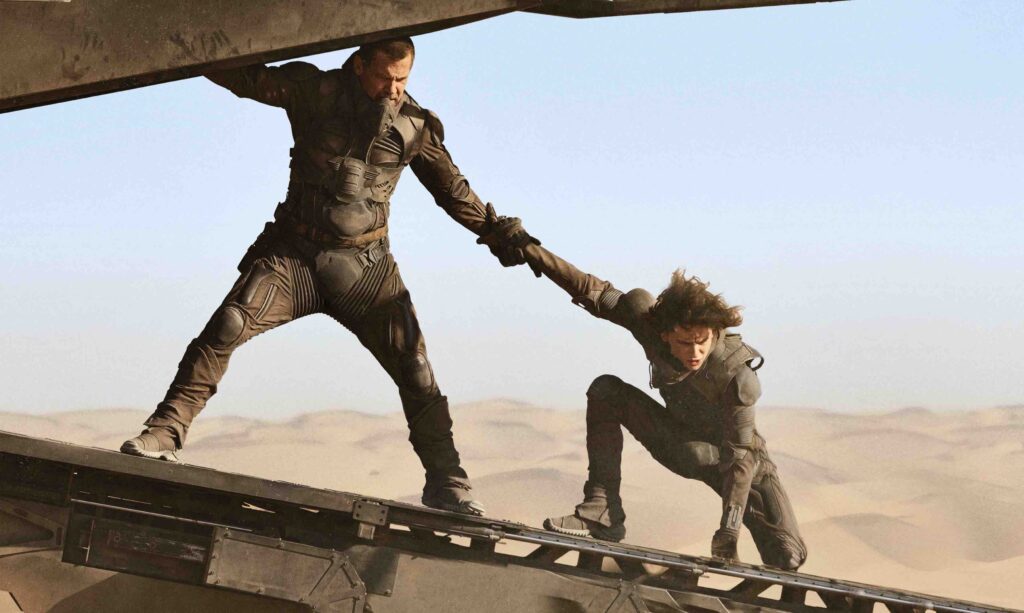Dune (2021)

DIRECTOR: Denis Villeneuve
CAST: Timothée Chalamet, Zendaya, Rebecca Ferguson, Oscar Isaac, Josh Brolin, Jason Momoa, Dave Bautista, Javier Bardem, Charlotte Rampling, Stellan Skarsgard, David Dastmalchian, Stephen McKinley Henderson, Chang Chen, Sharon Duncan-Brewster
REVIEW:
Frank Herbert’s 1965 sci-fi novel Dune, a futuristic geopolitical allegory that is unabashedly pro eco-radicalism, anti-corporate, and Islamophilic, is such a notoriously dense work that some believed it was unfilmable, even though it had an influence on various more commercialized sci-fi works that came after it, including George Lucas’ Star Wars (Dune takes place on a desert planet, features a scheming emperor, and involves a mystical power called “The Voice”….sound vaguely familiar?). Attempts were made, most prominently David Lynch’s borderline incoherent—and loosely adapted—1984 film, but its garbled narrative and the deviations it took from the source material rankled Dune fans. Later, a 2000 television miniseries adapted the plot more faithfully, but its low budget TV movie quality kept fans waiting for a definitive adaptation and did not fully allay concerns that perhaps Dune just didn’t work as a movie. Denis Villeneuve has tackled the ambitious task of bringing Dune to the screen in big-budget fashion, and while not a completely unqualified success, his version is successful and engaging enough that the biggest thing wrong with it is its subtitle “Part One”. The approximate first half of Herbert’s original novel has been brought to the screen, but with funding for the rest not yet secure, it remains to be seen if Villeneuve will be allowed to finish his work or whether this Dune will remain a half-told story.
A quick synopsis of Dune fails to fully convey its density, but here’s the basics. Many millennium into the future, mankind rules a far-flung interstellar empire dependent on spice harvested from the desert planet Arrakis, nicknamed “Dune”, for space travel, but conflicts between the spice harvesters and the native nomadic people the Fremen—not to mention the threat from massive sandworms—threatens the supply chain. The emperor assigns the noble House Atreides, led by Duke Leto Atreides (Oscar Isaac), his fiercely loyal concubine Lady Jessica (Rebecca Ferguson), and their son Paul (Timothée Chalamet), with uprooting from their lush homeworld and relocating to Arrakis to bring order and protect the spice flow. But the seemingly important assignment is a death trap. Forces are conspiring against House Atreides, and Arrakis’ former rulers, the brutal House Harkonnen, led by the sinister and scheming Baron Harkonnen (Stellan Skarsgard) and enforced by his brutish nephew Rabban (Dave Bautista), are plotting to destroy them. And meanwhile, young Paul is experiencing seemingly prophetic visions and dreams, haunted by a mysterious Fremen woman (Zendaya), and when events force the callow sheltered youth to flee into the desert wastes and throw himself on the mercy of the native Fremen, he might be taking his first step into his destiny.

While on the surface a sci-fi epic combining the scope of The Lord of the Rings with the labyrinthine political intrigue of Game of Thrones, it’s hard to deny that Dune is substantially less mainstream accessible than the likes of Star Wars despite its influence on them, an issue the filmmakers have tried to address, with mixed success. To non-Dune aficionados, much of its terminology—the Gom Jabbar test, the matriarchal mystics the Bene Gesserit and their long-prophesied messianic figure the Kwisatz Haderach—will sound like incomprehensible gibberish. Villeneueve’s film adaptation, from a script he co-wrote with Eric Roth and Jon Spaihts, keeps its exposition dumps quick and concise for the most part—avoiding the pitfall of David Lynch’s film, which got incomprehensibly bogged down—but some plot elements, like the machinations of the Bene Gesserit or the background political elements, are arguably a little thinly-developed and may remain hard to follow for Dune neophytes. The movie sticks fairly closely to the source material, with some fairly minor tweaks—the ecologist Dr. Kynes has been gender-flipped and cast with Sharon Duncan-Brewster, for example, and to be more politically correct in modern contexts, the Fremen word for the prophesied upcoming war has been changed from the original “jihad” to “crusade”—and with some minutiae that works better on the page than on the screen judiciously trimmed. Cinematographer Greg Fraser grants the film a suitably epic feel with sweeping wide shots (Villeneuve referenced Lawrence of Arabia as an influence), and production designer Patrice Vermette gives the settings a suitably otherworldly feel while keeping the environments subdued enough to feel like we’re in real locations. There is surely some CGI at work here, but it’s undetectable and the vessels have weight and feel, with unique designs; I was particularly taken with the dragonfly-like ornithopters and a tiny insectoid remote-controlled would-be assassin. Herbert wore his geopolitics on his sleeve, and the real-world allusions aren’t subtle—the corrupt empire’s reliance on the spice is analogous to the United States’ over-reliance on foreign oil, and the Fremen whose desert world it ransacks it from are modeled after Muslim Bedouins. Herbert also reached into history and mythology for influences (House Atreides is modeled after the heroic but ill-fated ancient Greek House of Atreus). The slow pace is broken up with a few action sequences—a rescue from a sandworm attack, and the lengthy battle and Paul and Jessica’s escape, most prominently—but anyone who goes into Dune anticipating the breakneck action of Star Wars or the J.J. Abrams Star Trek reboot is likely in for disappointment, and while Paul in Part One seems to be undergoing a fairly familiar “Chosen One” arc, those familiar with Dune will know the overall story does not go in conventional narrative directions (Herbert intended Paul’s eventual fate as a cautionary tale against placing blind faith in “Chosen One” heroic idols).

Villeneuve has assembled an impressive cast lineup, combining hot young stars (Oscar nominee Timothée Chalamet and Zendaya, finding her way into another potential franchise along with playing Spider-Man’s girlfriend) with older established screen veterans (Josh Brolin, Stellan Skarsgard), and those who are somewhere in between (Oscar Isaac, Rebecca Ferguson). Some of the actors are underused, though that’s the nature of the beast. Chalamet makes an appealing Paul, tempering his fledgling powers with a callow youthfulness that lends him vulnerability. Oscar Isaac is suitably noble as Duke Leto, while Rebecca Ferguson is both fierce and vulnerable as the conflicted Lady Jessica, torn between her loyalties to her Bene Gesserit order which sees Paul as a carefully orchestrated means to an end, and her love for him as a mother. Her conflict makes her a compellingly complicated character, although some of this arguably could have been better-developed. Josh Brolin and Jason Momoa provide House Atreides’ backup muscle as the stern, stoic Gurney Hallock and the more flamboyant warrior Duncan Idaho (an enjoyable supporting role that doesn’t tax Momoa’s limited acting abilities). Stellan Skarsgard, bald and in a fat suit, is suitably grotesque and ghoulish, but his portrayal of the Baron Harkonnen feels a bit flat and underwhelming, falling somewhere in between Kenneth McMillan’s hamfest in Lynch’s film (which was entirely too cartoonishly overacted to take seriously) and Ian McNeice’s deliciously Machiavellian Baron in the television miniseries. Likewise, an almost unrecognizable David Dastmalchian is well-cast as Piter De Vries, but his role is truncated to the point of having no character (whatever its many low budget shortcomings, it’s hard to deny that the television miniseries did a better job laying out the Harkonnen vs. Atreides scheming). Dave Bautista doesn’t get much to do, while Javier Bardem (as the gruff Fremen chieftain Stilgar) has basically a glorified cameo, presumably awaiting a larger role in Part 2; so too does Zendaya, who pops up in fleeting dreams and visions but doesn’t show up “in the flesh” until the last half hour or so, as Paul’s budding love interest. Charlotte Rampling, one of the go-to casting choices for icy matriarchal figures, has a cameo as the Reverend Mother, but makes an impression with it (of course, it helps that she gets the uneasy Gom Jabbar test scene). Characters like Emperor Shaddam and Feyd-Rautha are left offscreen, presumably waiting in the wings until Part Two.
While its mainstream appeal remains in some doubt, Dune: Part One is engaging enough that the biggest thing “wrong” with it is that its fans are left waiting on the box office results to sway Warner Bros. into making a concrete decision about greenlighting Part Two. While not devoid of flaws, the cast and crew is successful enough to deserves= a chance to complete the work they have started, but only time will tell whether we end up with a fully completed Dune in Villeneuve’s hands, or whether Part One is left forever tantalizingly unfinished.
* * *